
John Wayne
Marion Robert Morrison[1][a] (May 26, 1907 – June 11, 1979), professionally known as John Wayne and nicknamed "the Duke", was an American actor who became a popular icon through his starring roles in films which were produced during Hollywood's Golden Age, especially in Western and war movies. His career flourished from the silent era of the 1920s through the American New Wave, as he appeared in a total of 179 film and television productions. He was among the top box-office draws for three decades[3][4] and appeared with many other important Hollywood stars of his era. In 1999, the American Film Institute selected Wayne as one of the greatest male stars of classic American cinema.[5]
For other uses, see John Wayne (disambiguation). Not to be confused with John Wain.
John Wayne
June 11, 1979 (aged 72)
- Marion Michael Morrison
- "Duke" Wayne
- Actor
- producer
- director
1926–1979
Wayne was born in Winterset, Iowa, but grew up in Southern California. After losing his football scholarship to the University of Southern California due to a bodysurfing accident,[6] he began working for the Fox Film Corporation. He appeared mostly in small parts, but his first leading role came in Raoul Walsh's Western The Big Trail (1930), an early widescreen film epic that was a box-office failure. He played leading roles in numerous B movies during the 1930s, most of them also Westerns, without becoming a major name. John Ford's Stagecoach (1939) made Wayne a mainstream star, and he starred in 142 motion pictures altogether. According to biographer Ronald Davis, "John Wayne personified for millions the nation's frontier heritage."[7]
Wayne's other roles in Westerns included a cattleman driving his herd on the Chisholm Trail in Red River (1948), a Civil War veteran whose niece is abducted by a tribe of Comanches in The Searchers (1956), a troubled rancher competing with a lawyer (James Stewart) for a woman's hand in The Man Who Shot Liberty Valance (1962), and a cantankerous one-eyed marshal in True Grit (1969), for which he received the Academy Award for Best Actor. Wayne is also remembered for his roles in The Quiet Man (1952) with Maureen O'Hara, Rio Bravo (1959) with Dean Martin, and The Longest Day (1962). In his final screen performance, he starred as an aging gunfighter battling cancer in The Shootist (1976). Wayne made his last public appearance at the Academy Awards ceremony on April 9, 1979,[8][9] and died of stomach cancer two months later.[10] In 1980, he was posthumously awarded the Presidential Medal of Freedom, the highest civilian honor of the United States.[11][12]
Career[edit]
Early works and first lead role[edit]
As a favor to coach Jones, who had given silent Western film star Tom Mix tickets to USC games, director John Ford and Mix hired Wayne as a prop boy and extra.[27][28] Wayne later credited his walk, talk, and persona to his acquaintance with Wyatt Earp, who was good friends with Tom Mix.[27] Wayne soon moved to bit parts, establishing a longtime friendship with the director who provided most of those roles, John Ford. Early in this period, he had a minor, uncredited role as a guard in the 1926 film Bardelys the Magnificent. Wayne also appeared with his USC teammates playing football in Brown of Harvard (1926), The Dropkick (1927), and Salute (1929) and Columbia's Maker of Men (filmed in 1930, released in 1931).[29]